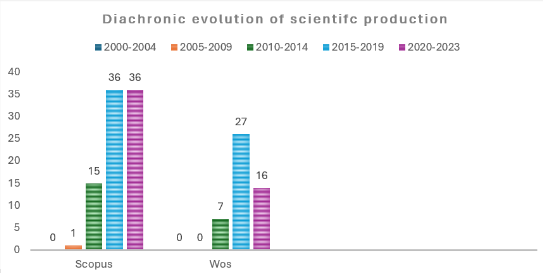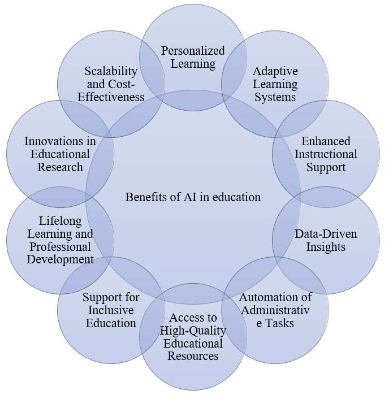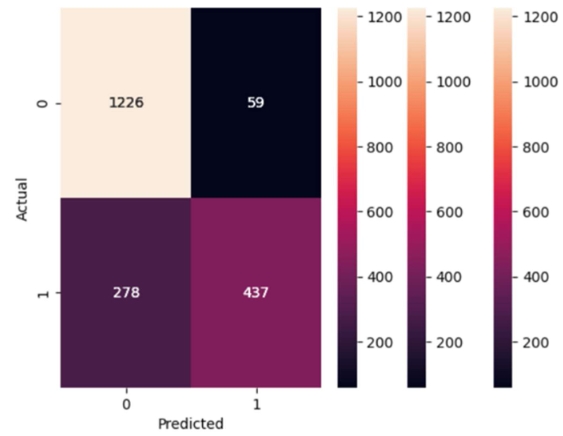Navigating professional growth: Exploring reflective practices in EFL teacher leadership within Arab higher education contexts
Abstract
Employing an interpretive lens and utilizing a case study methodology, this research investigated insights from a purposively selected cohort of 12 English as a Foreign Language (EFL) teacher leaders on the significance of reflective practice in their professional growth within an EFL environment. Through a qualitative approach, data was collected via semi-structured interviews and an open-ended questionnaire. The findings reveal the multifaceted operational and instructional leadership roles undertaken by EFL teacher leaders within the hierarchical structures of the English Language Institute (ELI). These leaders demonstrate a commitment to reflective practices and proactive learning, utilizing collegiality and collaborative reflection to enhance their leadership skills and navigate contextual challenges at the ELI. In the landscape of higher education, EFL teacher leadership emerges from intrinsic motivation to learn and adapt to context-specific roles. This entails reflecting on diverse experiences and applying accumulated knowledge to enhance practical leadership competencies.
References
[1]Collin S, Karsenti T, Komis V. Reflective practice in initial teacher training: critiques and perspectives. Reflective Practice. 2013; 14(1): 104-117. doi: 10.1080/14623943.2012.732935
[2]Clarà M. What Is Reflection? Looking for Clarity in an Ambiguous Notion. Journal of Teacher Education. 2014; 66(3): 261-271. doi: 10.1177/0022487114552028
[3]Feucht FC, Lunn Brownlee J, Schraw G. Moving Beyond Reflection: Reflexivity and Epistemic Cognition in Teaching and Teacher Education. Educational Psychologist. 2017; 52(4): 234-241. doi: 10.1080/00461520.2017.1350180
[4]Schon DA. The Reflective Practicioner: How Professionals Think in Action. Basic Books New York; 1983.
[5]Zeichner KM, Liston DP. Reflective Teaching. Routledge; 2013. doi: 10.4324/9780203771136
[6]Mann S, Walsh S. Reflective Practice in English Language Teaching. Routledge; 2017. doi: 10.4324/9781315733395
[7]Benitt N. Campus meets classroom: Video conferencing and reflective practice in language teacher education. European Journal of Applied Linguistics & TEFL. 2019; 8(2).
[8]Fox RK, Dodman S, Holincheck N. Moving beyond reflection in a hall of mirrors: developing critical reflective capacity in teachers and teacher educators. Reflective Practice. 2019; 20(3): 367-382. doi: 10.1080/14623943.2019.1617124
[9]Cappelletti G, Sajon MP. The reflective processes of principals as an engine of school change. Reflective Practice. 2022; 23(2): 246-257. doi: 10.1080/14623943.2021.2014310
[10]Lambert L. Leadership redefined: an evocative context for teacher leadership. School Leadership & Management. 2003; 23(4): 421-430. doi: 10.1080/1363243032000150953
[11]Ezzi SW, Teal EJ, Izzo GM. The influence of Islamic values on connected generation students in Saudi Arabia. Journal of International Business and Cultural Studies Volume. 2014; 9: 1-19.
[12]York-Barr J, Duke K. What Do We Know About Teacher Leadership? Findings From Two Decades of Scholarship. Review of Educational Research. 2004; 74(3): 255-316. doi: 10.3102/00346543074003255
[13]Shah SRA. The Emergence of Teacher Leadership in TESOL: An Exploratory Study of English Language Teachers as Teacher Leaders in the Saudi EFL Context. Journal of Education in Black Sea Region. 2019; 5(1): 136-156. doi: 10.31578/jebs.v5i1.196
[14]Katzenmeyer M, Moller G. Awakening the Sleeping Giant: Helping Teachers Develop as Leaders. Corwin Press; 2009.
[15]Chelliah KK, Arumugam Z. Does Reflective Practice Enhance Clinical Competency in Medical Imaging Undergraduates? Procedia - Social and Behavioral Sciences. 2012; 60: 73-77. doi: 10.1016/j.sbspro.2012.09.349
[16]Kolb DA. Experiential Learning: Experience as the Source of Learning and Development. FT press; 2014.
[17]Dewey J. A Restatement of the Relation of Reflective Thinking to the Educative Process. DC Heath; 1933.
[18]Sullivan LG, Wiessner CA. Learning to be reflective leaders: A case study from the NCCHC Hispanic leadership fellows program. New Directions for Community Colleges. 2010; 2010(149): 41-50. doi: 10.1002/cc.394
[19]Guthrie KL, Jones TB. Teaching and Learning: Using Experiential Learning and Reflection for Leadership Education. New Directions for Student Services. 2012; 2012(140): 53-63. doi: 10.1002/ss.20031
[20]Norsworthy BE. Being and Becoming Reflexive in Teacher Education [PhD thesis]. The University of Waikato; 2008.
[21]Wallace MJ. Training Foreign Language Teachers: A Reflective Approach. Cambridge University Press; 1991.
[22]McAlpine L, Weston C. Reflection: Issues related to improving professors’ teaching and students’ learning. In: Hativa N, Goodyear P (editors). Teacher Thinking, Beliefs and Knowledge in Higher Education. Springer; 2002. pp. 59-78. doi: 10.1007/978-94-010-0593-7_4
[23]Moon JA. A Handbook of Reflective and Experiential Learning. Routledge; 2013. doi: 10.4324/9780203416150
[24]Guo L. How should reflection be supported in higher education?—A meta-analysis of reflection interventions. Reflective Practice. 2021; 23(1): 118-146. doi: 10.1080/14623943.2021.1995856
[25]Inman M. The Journey to Leadership: A Study of How Leader-Academics in Higher Education Learn to Lead [PhD thesis]. University of Birmingham; 2007.
[26]Grimmett PP, Riecken TJ, Erickson GL, Mackinnon AM. Summary of a review of research on reflection in teacher education. Images of Reflection in Teacher Education. 1988; 9-10.
[27]Fendler L. Teacher Reflection in a Hall of Mirrors: Historical Influences and Political Reverberations. Educational Researcher. 2003; 32(3): 16-25. doi: 10.3102/0013189x032003016
[28]Beauchamp C. Understanding Reflection in Teaching: A Framework for Analysing the Literature [PhD thesis]. Université McGill; 2006.
[29]Lubbe W, Botha CS. The dimensions of reflective practice: a teacher educator’s and nurse educator’s perspective. Reflective Practice. 2020; 21(3): 287-300. doi: 10.1080/14623943.2020.1738369
[30]Furtado L, Anderson D. The Reflective Teacher Leader: An Action Research Model. Journal of School Leadership. 2012; 22(3): 531-568. doi: 10.1177/105268461202200305
[31]Crotty M. The Foundations of Social Research: Meaning and Perspective in the Research Process. Sage; 1998.
[32]Schwandt TA. Constructivist, interpretivist approaches to human inquiry. Handbook of Qualitative Research. 1994; 1: 118-137.
[33]Bryman A. Social Research Methods, 4th ed. Oxford University Press; 2012.
[34]Yin RK. Case Study Research. Design and Methods. SAGE Publications; 2003. pp. 93-96. doi: 10.1097/FCH.0b013e31822dda9e
[35]Cohen L, Manion L, Morrison K. Research Methods in Education. Routledge; 2017. doi: 10.4324/9781315456539
[36]Creswell J, Poth C. Qualitative Inquiry and Research Design: Choosing among Five Approaches, 4th ed. Thousand Oaks: Sage Publications; 2018.
[37]Saldaña J. The Coding Manual for Qualitative Researchers. Sage; 2021.
[38]Norton L, Campbell A (editors). The development of reflective practice in higher education: A theoretical perspective. In: Learning, Teaching and Assessing in Higher Education: Developing Reflective Practice. Sage; 2007. pp. 140-148.
[39]Alexandrou A, Swaffield S, MacBeath J. Scottish teacher leaders: Two accidental journeys enacting leadership for learning. In: Teacher Leadership and Professional Development. Routledge; 2016. pp. 215-230.
[40]Burgoyne J, Stuart R. Teaching and Learning Methods in Management Development. Personnel Review. 1978; 7(1): 53-58. doi: 10.1108/eb055353
[41]Stephenson L. Leadership perspectives and influences: A conversation with five leaders in TESOL. Arab World English Journal. 2012; 19-35.
[42]Hager P, Hodkinson P. Becoming as an appropriate metaphor for understanding professional learning. In: Scanlon L (editor). “Becoming” a Professional: An Interdisciplinary Analysis of Professional Learning. Springer; 2011. Volume 16. pp. 33-56. doi: 10.1007/978-94-007-1378-9_2
Copyright (c) 2024 Sayyed Rashid Ali Shah, Hamid Ali Khan Eusafzai

This work is licensed under a Creative Commons Attribution 4.0 International License.









